
Electronic english version since 2022 |
The newspaper was founded in November 1957
| |
At the end of the year
It's Martin Bures again. Further acquaintance
I and our readers became acquainted with the Czech JINR employee Martin Bures four years ago ("Meet, this is Martin Bures", No. 52 of the Weekly, 2018). Having met Martin this summer by chance at the JINR Universal Public Library at the evening of the traveler Anton Krotov (Martin met him, became friends with him and then organized lectures for the citizens of Dubna), we agreed on a new interview. It took place immediately after his return from a business trip to St. Petersburg and we started a conversation with it.
I participated in the Euler Institute School on Quantum Algorithms that was held from 5 to 12 December in St. Petersburg. We listened to lectures in a beautiful hall, from the windows of which a stunning view of the Palace Square opened. The snowfalls had just passed, the square was covered with snow, they began to install a Christmas tree. It was amazing! Finally, my dream to see the snow-covered St. Petersburg had come true. I started dreaming about it 14 years ago when I first saw the film "The Irony of Fate" and thought how beautiful St. Petersburg looked in winter (however, I later found out that some episodes were filmed with artificial snow).
Do you also watch "The Irony of Fate" every year?
No, I watched it in its entirety twice and then only in fragments when it was shown on the eve of the New Year. By the way, in the Czech Republic every year on New Year's Eve your fairy tale "Morozko" is shown. The Czechs love it very much and the New Year has never passed without this fairy tale. And this year will be no exception.
Returning to the St. Petersburg School, I must say that only Vladimir Gerdt was involved in quantum algorithms at MLIT. With his departure, this topic hasn't been discussed for some time, but now we are returning to it. We have started to understand some algorithms that can be used in processing data from the NICA collider in the future. And just then, this School was held that has contributed to an even more depth in the subject of quantum algorithms.
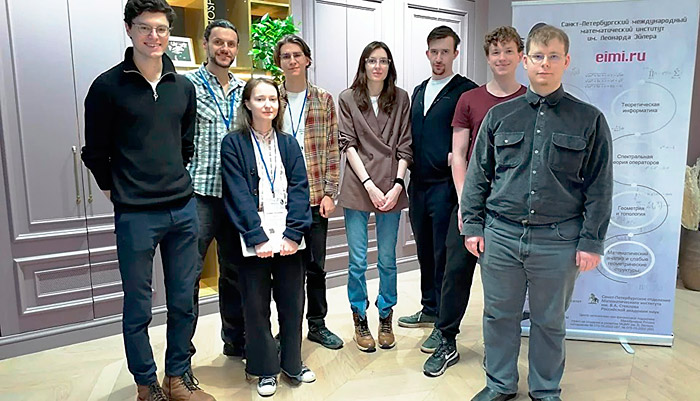
My team at the School.
There were interesting theoretical and experimental reports by the specialists from the Russian Quantum Centre, Skoltech (Moscow) and ITMO (St. Petersburg) at the School. Among the lecturers, there was one of the most famous people involved in quantum computing in Russia, Alexey Fedorov (Moscow, Russian Quantum Centre), and we also heard a lecture on quantum technologies by experimenter Sergey Kulik (MSU). It is always very useful to listen not only to theorists, but also to experimenters that can bring you down to earth a little. The lecturer said that to design a real, universal quantum computer is not a matter of the near future and he explained in detail what obstacles would need to be overcome in order for the quantum computer to operate.
The main problem is that the quantum computer has a "bad memory". Data in it is stored in qubits (quantum discharge of data storage - ed.) that must be protected from environmental impacts - decoherence, the main enemy of quantum computing. And it is necessary to save qubits throughout the entire run time of the quantum algorithm, until its very end and this is precisely the problem. A quantum algorithm is a certain sequence of transformations of quantum states that brings qubits into some state, entangles them (meaning quantum entanglement), some goal of the algorithm is achieved and in order to find out the result, we need to make a measurement that we interpret with a certain way.
The task of quantum computers is to significantly speed up calculations, but only of a certain class. This is a very interesting task of theoretical computer science - to find out what problems can be solved faster than on classical computers, to build quantum algorithms.
For specifics: there is a classic traveling salesman problem - finding the most profitable route passing through the specified cities - this is the task of finding some kind of optimum. The problem is that the computation time on classical computers grows very quickly and even for several dozen cities this issue cannot be met by the method of exhaustive enumeration of options even in billions of years.
One kind of quantum computer (from D-Wave Systems) speeds up the solution of such optimization problems, using the so-called quantum annealing.
There are many generalizations: if you expand the task to several delivery vehicles, add additional parameters, such as time windows in which you need to deliver the order, restrictions on the capacity of the car and other factors, then you get a completely modern logistical problem and naturally, not only transport companies need its efficient solution. At School, a variant of the traveling salesman problem was solved by me and my group, formulated by a representative of Gazprom Neft. So it turned out to be a good pairing of theory and practice.
The current classical algorithms do not give us an optimal solution to such problems and quantum computers will be useful here. However, having optimization problems is one thing and the main task of scientists is to design a universal quantum computer that can solve a wider range of problems.
But as I have said, there are still doubts whether we'll have quantum computers on a par with classical ones. Some calculations on a small number of qubits can already be carried out, but real calculations require many more qubits. And it is still impossible to maintain a certain state of qubits for the time when calculations are in progress due to decoherence. The accuracy of the calculations and the coherence time should increase significantly, by many orders of magnitude, so there is a lot of work to be implemented. I am sure that such research will be carried out all over the world, yet today, no one can say with certainty that a universal quantum computer will be designed. Many believe that quantum annealing and computers such as D-Wave that however are not universal quantum computers, are in the nearest future.
There is another event that is pleasant for me concerning this School. My classmate at a gymnasium in the Czech Republic, Tomas Vyskochil that was mainly interested in computer science, yet also showed interest in physics, recommended a book to me when we studied together in the gymnasium that probably became the main reason why I chose physics as my profession. It was R.Feynman's book "Are you joking, Mr. Feynman?" It inspired me a lot. In high school, I started getting excellent marks in physics and mathematics and successfully passed exams at all four universities in the Czech Republic where I could study theoretical physics. And Tomas has recently lived in the USA, where he stayed to work after graduate school, sometimes he came to the Czech Republic, we met, became even closer than in childhood. And when at the St. Petersburg School we analyzed an article on the traveling salesman problem, I saw his name in the links to the article, it turns out that Tomas came up with a new method for restrictions for this problem. Tomas, unfortunately, died last year from cancer, just like R.Feynman did in his time. The fact that he dealt with this topic was a big surprise for me.
During the time that has passed since our last interview, you moved from BLTP to MLIT, although you collaborated with V.P.Gerdt before that.
After the death of Vladimir Petrovich, our Sector of algebraic and quantum calculations has been headed by Arsen Khvedelidze. We currently deal with topics related to the mathematical aspects of the quantum states of an n-dimensional quantum system. In quantum computers, memory and a quantum register are two-level states of quantum systems - qubits and we analyze all kinds of mathematical aspects of these states. Analysis often requires a metric that determines the distance between points in the space of quantum states. One of the metrics that people like to use in quantum physics is the Bures metric, introduced in 1969. I was pleasantly surprised to learn about my famous namesake and compatriot Donald Bures. I tried to find him that turned out to be very difficult. But a year later, his son answered me on social networks. I hope, Donald will write, too.
Today, we also return to quantum algorithms in the Sector, such as to an algorithm for solving a system of linear equations that are used almost everywhere, including in data processing. If we accelerate this process with the help of quantum computers, then the processing of data will go much faster. And since I have recently visited the main console of the NICA collider, it became especially interesting for me to participate in solving this problem.
It turns out that, having moved to another Laboratory, you did not change your research area, did you?
It was important for me to deal with fundamental science and the principles of quantum physics. Before the themes of quantum information theory and quantum computing secured their place in science, all the unresolved problems of quantum physics, starting with the dispute between Bohr and Einstein, were mainly dealt with by reputable university professors and young scientists were strongly discouraged from delving into this topic, especially at the beginning of a career. And today, this can be done, although not directly, since it is necessary for understanding the processes in quantum computers, like the measurement process.
In Bohr's interpretation, reality does not exist until we carry out a measurement. When and in general, does the collapse of the wave function occur, what is its cause? Measuring device or human consciousness? Here, there is an intersection with the topic of our conference "Quantum physics about consciousness and the universe" from the series "Science. Philosophy. Religion" that was held a year ago (see No. 50 of the Weekly for 2021). Well-known specialist Andrey Khrennikov, a professor at the Swedish University, spoke at it, as it turned out, he was familiar with Alexander Alodzhants (ITMO), a speaker at the last School in St. Petersburg. Together they wrote an interesting article about the social laser (analogy of the physical laser), it was nice to meet him. By the way, I was motivated to participate in the organization of the last Conference "Science. Philosophy. Religion", the desire to understand the models of consciousness from the point of view of quantum physics. I knew they occurred, but I was skeptical about them. So far, there is no consensus on this and I am still not sure if quantum physics is required to explain consciousness.
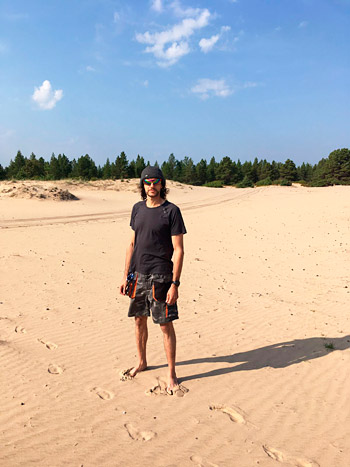 |
| In the "desert" (Varzuga River, Murmansk region). |
This summer, I once again visited India, my best friend invited me to a wedding. I had to dance in a dark suit in the sun in the 40-degree heat! In May, I had a chance to go kayaking along the Msta River with an institute company. There is a lot of water in May, but it is still cold. I was cold and during the trip an Indian friend called: come to the wedding, you will get warm!
This year, I have been very lucky with my travels. The most important thing is Kamchatka that I have been dreaming about for the last 10 years. And then there has been an interesting opportunity to work as a volunteer for several weeks in the reserve in the Valley of Geysers.
What did you do as a volunteer?
I unloaded helicopters, chopped firewood for a bathhouse and helped scientists. When it snows there and snow in Kamchatka lies until July, there is enough work, but at the end of winter it was easier, on average, I worked two hours a day. And I know how to chop wood and I have loved it since childhood, we had a dacha where I practiced. One volunteer with extensive experience was very surprised that I had just arrived, yet I was a specialist in chopping firewood! I also made some suggestions regarding garbage sorting, since in Dubna I sort very carefully, into ten separate bags. In Dubna, you can donate almost all garbage, even for money, but more on that another time. We had our own chef that is not available at all points of the reserve, we were fed very tasty food. And in my free time, I read in silence at the top, next to the helipad, from where picturesque views and beautiful sunsets opened up. A volcanologist flew to us, he took me with him to help to bring the equipment and carry out all kinds of investigations, or maybe to reduce the likelihood of being eaten by a bear. I learned a lot of interesting things from him about the Valley of Geysers, the emergence of volcanoes, the potential of geothermal energy.
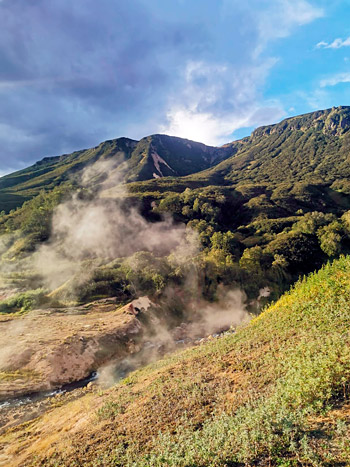 |
| Valley of Geysers. |
At this time, they go to rivers to fish, but in general, they constantly go to the base, although they are not fed (this is strictly prohibited), all garbage is taken out, but they still go there. We all the time wore bear flares, they give a very strong light, I felt much safer with them. Although the territory of the base is very small, geysers are visible from it. We had several excursions, I was late for one of them, I caught up alone, in anticipation of a possible meeting with a bear but in general, I like to travel alone - all this gives me such adrenaline! So, I really liked Kamchatka and the Valley of Geysers is just one of the points where you can come as a volunteer, there are still not so famous, but very beautiful places.
I would not like to go there as a tourist, tourists are brought by helicopter for two hours and taken back and we lived in these stunning landscapes for two weeks. And in my opinion, September is the best month to visit: in summer it is often rainy and cloudy and in September it is still warm, clear blue skies admire with beautiful sunrises and sunsets. And back to Petropavlovsk-Kamchatsky, we flew by helicopter along the coast and I won't exaggerate much if I say that during this one and a half hour flight I saw the most beautiful landscapes in my life: valleys dotted with snakes of rivers, endless forests, decorated with a variety of colors of foliage and the very coast line. While I was waiting for the helicopter to the reserve, I lived in Petropavlovsk for a week, went on excursions in the surroundings, climbed the Avachinsky volcano and this is a two-kilometer elevation difference. And of course, I got acquainted with new people.
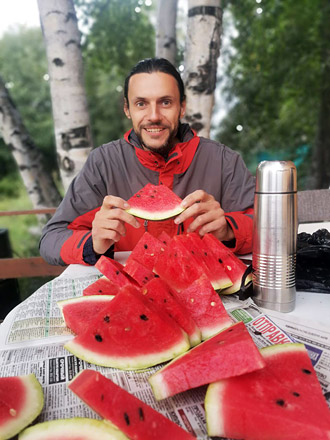 |
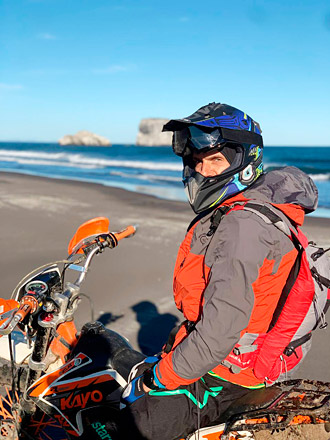 |
| Kamchatka. Zelenovskie lakes. Rest after thermal baths. | Kamchatka. On a motorcycle - to the beach with black sand. |
Since our last interview, I have already visited Karelia several times and this year, the Kola Peninsula, even twice. My car broke down there, I left it, looked for the right spare part and two months later, I was able to return. And I did not regret that I had to return in October - I met a wolf, looked into his eyes and for the first time in my life I saw the northern lights, a spectacle of extraordinary beauty! I was lucky with the weather: it was raining on the way and there were three fine days, I drove to the border with Finland, visited several national parks. I met old friends, made new ones: due to the fact that a tire was pierced, I visited the second largest Russian museum of samovars. This happens on every trip. Next year, I hope to go to Altai, most likely, on a motorcycle. Maybe, I can get to Magadan.
You have surprised me with the versatility of your interests. Are there any new hobbies?
I sing in the choir "Credo", play the piano and study at the Music School, I go skating, not only at the skating rink, but I also tried it on the Moscow Sea. And in summer, I learned to ride a wakeboard, behind a boat, I liked it. However, the biggest hobby is ballroom dancing, I started taking classes last year, I go by car to Tver. My girlfriend and I have a wonderful teacher, we have already participated in several competitions in Moscow and St. Petersburg. I to go to Blokhintsev Library, there are very interesting events that many of my friends that are not from Dubna like. I am very glad that the library works in this format, its employees put a lot of mental effort into organizing wonderful events for adults and children and invite interesting speakers. I am very glad that I live in the Institutskaya part of the city, everything is nearby - work, the Cultural Centre, the Music School, the Library, the Stadium.
That's the kind of person he is - energetic, inquisitive, sociable. He meets old friends where he did not expect, makes new ones so easily that one can only envy. Let's not envy Martin's tourist impressions, let's travel around our native Russia as much as a Czech employee of JINR does and let's start already during the New Year holidays!
Olga TARANTINA,
photo by Martin BURES